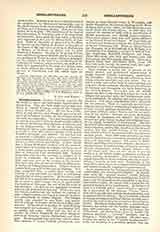

Gesta Romanorum, a medieval collection of anecdotes, to which moral reflections are attached. It was compiled in Latin, probably by a priest, late in the thirteenth or early in the fourteenth century. The ascription of authorship to Berchorius or Helinandus can no longer be maintained. The original object of the work seems to have been to provide preachers with a store of anecdotes with suitable moral applications. Each story has a heading referring to some virtue or vice (e.g. de dilectione); then comes the anecdote followed by the moralisatio. The collection became so popular throughout Western Europe that copies were multiplied, often with local additions, so that it is not now possible to determine whether it was originally written in England, Germany, or France. Oesterley, its latest critical editor (Berlin, 1872), is of opinion that it was originally composed in England, whence it passed to the Continent, and that by the middle of the fourteenth century there existed three distinct families of MSS.: the English group, written in Latin; the Latin and German group; and a third group represented by the first printed editions. The MSS. differ considerably as to number and arrangement of articles, but no one MS. representing the printed editions exists. Probably the editors of the first printed edition selected stories from various MSS. Their volume was a folio issued from the press of Ketelaer and De Leempt at Utrecht, while a second edition was published by Ter Hoenen at Cologne. Shortly after this collection had been published, an enlarged edition, now known as the Vulgate, was issued, containing 181 stories. This was compiled from the third group of MSS., and was printed by Ulrich Zell at Cologne. All these three editions appeared between 1472 and 1475, and subsequent reprints were numerous. The first English translation, based on the English group of MSS., was issued by Wynkyn de Worde about 1510, and was followed by others. These English editions have many stories in common with the Vulgate, but include others derived from the English MSS. None of the English editions, old or new, give the moralizations in their entirety, full as they are of Catholic teaching, dogmatic and moral. Though the title of the work suggests Roman history as the chief source of the stories, many of them are taken from later Latin or German chronicles, while several are Oriental in character. In estimating the wide influence of the “Gesta” it must be remembered that the collection proved a mine of anecdotes, not only for preachers, but for poets, from Chaucer, Lydgate, and Boccaccio down through Shakespeare to Schiller and Rossetti, so that many of these old stories are now enshrined in masterpieces of European literature.
EDWIN BURTON

